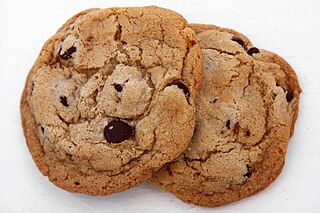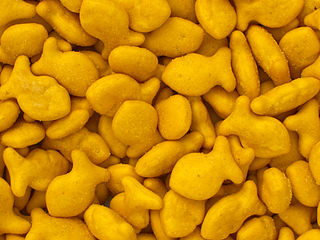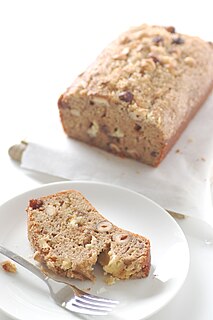
Bakewell Cream is a variety of baking powder developed by Bangor, Maine chemist Byron H. Smith in response to a shortage of cream of tartar in the U.S. during World War II. It is sold throughout the U.S., but is most popular in the state of Maine. [1] [2]

Baking powder is a dry chemical leavening agent, a mixture of a carbonate or bicarbonate and a weak acid. The base and acid are prevented from reacting prematurely by the inclusion of a buffer such as cornstarch. Baking powder is used to increase the volume and lighten the texture of baked goods. It works by releasing carbon dioxide gas into a batter or dough through an acid-base reaction, causing bubbles in the wet mixture to expand and thus leavening the mixture. The first single-acting baking powder was developed by food manufacturer Alfred Bird in England in 1843. The first double-acting baking powder was developed by Eben Norton Horsford in America in the 1860s.

Bangor is a city in the U.S. state of Maine, and the county seat of Penobscot County. The city proper has a population of 33,039, while the Bangor metropolitan area has a population of 153,746.

World War II, also known as the Second World War, was a global war that lasted from 1939 to 1945. The vast majority of the world's countries—including all the great powers—eventually formed two opposing military alliances: the Allies and the Axis. A state of total war emerged, directly involving more than 100 million people from over 30 countries. The major participants threw their entire economic, industrial, and scientific capabilities behind the war effort, blurring the distinction between civilian and military resources. World War II was the deadliest conflict in human history, marked by 50 to 85 million fatalities, most of whom were civilians in the Soviet Union and China. It included massacres, the genocide of the Holocaust, strategic bombing, premeditated death from starvation and disease, and the only use of nuclear weapons in war.
The current manufacturer, the New England Cupboard, is the successor to Byron Smith's original company. Their Bakewell-related products include the original baking powder in several varieties and a biscuit mix, all sold through several channels under the "Bakewell Cream" label. All varieties include acid sodium pyrophosphate, which was Byron Smith's original unique ingredient; those sold as "baking powder" also include sodium bicarbonate. [3]

Sodium bicarbonate (IUPAC name: sodium hydrogen carbonate), commonly known as baking soda, is a chemical compound with the formula NaHCO3. It is a salt composed of a sodium cation (Na+) and a bicarbonate anion (HCO3−). Sodium bicarbonate is a white solid that is crystalline, but often appears as a fine powder. It has a slightly salty, alkaline taste resembling that of washing soda (sodium carbonate). The natural mineral form is nahcolite. It is a component of the mineral natron and is found dissolved in many mineral springs.















